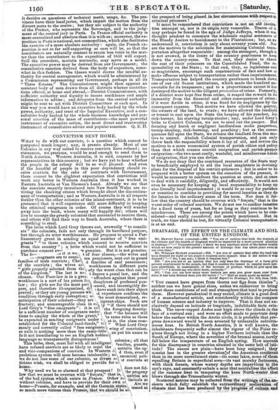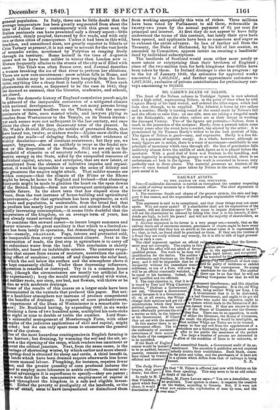DRAINAGE, ITS EFFECT ON THE CLIMATE AND SOIL
OF THE -UNITED KINGDOM.
Mr. Hawirr Devul examined.-368. "You are of opinion that both the warmth of the climate and the health of England would be improved by a more general adoption of drainage ?"—" Unquestionably; I think we may attribute much of the better health which we now enjoy to the greater amount of drainage that has taken place even in our own time."
Mr. WILLIAM Ileum examined.-293. " Are you of opinion that after the land his been drained for eight or ten years it requires more manure than It did before it wag drained ? "—" No, I am not ; I think It requires less.
299. "Are you not of an opinion that not only does the drainage of a farm give present employment to the people, but that it enables the tenant to employ more persons afterwards, in consequence of the Increase of produce which he gets upon his farm ?"—" I should say one-third more, certainly."
301. "Can you say how many mom bushels per acre you grow upon your farm since it has been-drained than you did before ? "— Half as ninth again as before." Lords' Report on Draingge, No. 950, Sees, 1849.
"You cannot have grapes from thorns nor figs from thistles"; neither can we have genial skies, unless we endeavour to bring about those conditions of soil and atnioaphere that tend to produce them. However paradoxical it may sound, climate is a good deal of a manufactured article, and considerably within the compass of human science and industry to improve. That it does not exclusively depend on latitude or longitude,' indubitable facts establish. The snow-capped Andes soar high above the clouds in the face of a vertical sun ; and were an effort made to penetrate deep below the surface within the Arctic circle, it is probable that progress downward would be soon arrested by unbearable subterraneous heat. In British North America, it is well 'Known, the inhabitants frequently suffer almost the rigour of the Polar regions though not living in a higher Northern latitude than the South of Europe, where the severities of the brumal seation.rarely fall below the temperature of an English spring. How account for this discrepancy in countries situated in the same belt of latitude? The causes are plain—have been long assigned; they consist less in the greater elevation:of the American continent than in its more unreclaimed state—its ocean lakes, some of them equalling Britain in superficial area—its vast marshy fastnesses, with thick forests, whose watery depths are irnpervione to the sun's rays, and. constantly exhale a mist that neutralizes the 'effect of the summer heat in tempering the keen North-wester that blows through-the Transatlantic winter. Scattered notices may be collected from the writings of the ancients which fully establish the extraordinary melioration of climate that has been produced by the progress of culture and general population. In Italy, there can be little doubt that the average temperature has been greatly augmented from about the time of Julius Ctesar : contemporary with this great man the Italian peninsula can have presented only a dreary aspect—little cultivated, thinly peopled, traversed by few roads, and with only two or three cities of consequence. Unless it Ind been in this wild, trackless, and unenclosed state, not greatly superior to Siberia or Crim Tartary at present, it is not easy to account for the vast herds of nomadic swine, mentioned by Polybius as ranging freely through its territory. Rome herself in the time of Augustus seems not to have been milder in winter than London now is. Horace frequently alludes to the streets of the city as if filled with snow. The Tiber was often frozen over, and Juvenal describes a woman breaking the ice of that river to perform her ablutions. These are now rare occurrences: snow seldom falls in Rome, and though icicles may be occasionally seen hanging from the fountaMs, anything like a sharp frost is hardly ever felt. When such pbmnomena do occur, as happened to be the case in 1842 they are deemed so uhusual, that the libraries, academies, and schools, are closed.
From the domestic history of England cumulative proofs might be adduced of the inseparable connexion of a mitigated climate with national development. There are not many persons living who have witnessed bonfires on the Thames, with the accompaniments of fairs, oxen roasted whole, and lawyers plying in coaches from Westminster to the Temple, on its frozen stream : et such scenes were not unfrequent in the last century, and once bout the close of the first decennary term of the present. In Mr. Wade's British History, the notices of protracted frosts, that are lasted ten, twelve, or sixteen weeks—Alpine snow-drifts that topped the mails—of deluging floods, with other evidences of 'ntry desolation—are of constant occurrence ; but they are, we aspect, bygones, almost as unlikely to recur as the feudal sys m or the despotism of the Stuarts. Still we are only on the breshold of climatic as of sanatory reform ; and with more dictive energy in the State, aided by the unequalled resources of dividual capital, science, and enterprise, that are now latent, or nemployed from the absence of initiative impulse and organition, it would be impossible to assign the acme of felicity and e greatness the empire might attain. That milder seasons are *thin compass—that the climate of the Rhine or the Rhone "ght be brought home to England and Ireland—that clustering neyards might be made to gladden the heart on the open downs f the British Islands—form not extravagant anticipations of a
• ssible future. In the short term that °has elapsed since the eace, from the vast increase of house-building and agricultural provements,—for that agriculture has been progressive, as well trade and population is undeniable, from the broad fact that produce has nearly kept pace in corn and animal food with the pidly increasing consumption,—it seems little doubtful that the mperatnre of the kingdom, on an average term of years, has en already raised several degrees. To continue this onward career—to insure longer summers and orter winters—the great auxiliary is that which to a limited exnt has been lately in operation, but demanding augmented imse—namely, DRAINAGE. Fogs, intense and protracted cold, e inseparable from every over-moistened climate. Next to the instruction of roads, the first step in agriculture is to carry off e redundant water from the land. This conclusion is shortly ducible, and based on indubitable science. The constant evapotion that ensues from excess of moisture, neutralizes the quickng effect of sunshine; • carries off and disperses the solar heat, which the soil below the surface and the atmosphere above it
• kept constantly chilled. Under these depressing influences, getation is retarded or destroyed. Try it in a common house • nt, (though the circumstances are mostly too artificial for a r experiment); keep the mould constantly soaked with water, d neither roots, nor stem, nor bud, nor flowers, will, thrive or be fine as with moderate drainage. Some of the results of this course on a larger scale have been mnuicated in the extracts that prefaced this paper. But neir a healthier atmosphere nor increase of produce comprehend the benefits of drainage. In reppect of mere productiveness, experiment of the Dean of Westminster is a remarkable inflee; Dr. Buckland having, by expending 600/. in six weeks draining a farm of two hundred acres, multiplied his corn-ricks in eight or nine to double or treble the number. Lord Stan's successful management of Mossborough Farm, with other mples of the judicious applications of skill and capital, might cited ; but we can only spare room to enumerate the general es of the system.
ne of the most hazardous contingencies in English farming is te harvest; but draining, by warming the soil and the air, acrates the ripening of the crops, which renders less imminent or uent the critical juncture. Next, from the same cause, is the antage of shortening winter, by which earlier and more abundspring-food is obtained for sheep and cattle. A third benefit is, lands which have been drained require afterwards less horse more manual labour. Ploughing, for instance, requires fewer
s, and the greater i quantity of corn produced induces the er to employ more labourers n arable culture. General ecoical advantages it is superfluous to specify—they are patent ; a wide field for the remunerative employment of capital is ed throughout the kingdom in a safe and eligible investt. Either the poverty or prodigality of the landlords, or the rs of entail, seem to have incapacitated or disinclined them from working energetically this vein of riches. Three millions have been voted by Parliament to aid them, redeemable in twenty-two years by the annual payment of 6i per cent for principal and interest. At first they do not appear to have fully understood the terms of this contract, but lately their eyes have been opened, and applicants have been so numerous and eager as to exhaust the entire advance. In lieu of further aid from the Treasury, the Duke of Richmond, by his bill of last session, as amended in Committee, appears intent on creating a landlords' fund by individual subscriptions.
The landlords of Scotland would seem either more needy or more astute or enterprising than their brethren of England ; since of the two-million loan for both kingdoms four-fifths have been taken by them. In Ireland drainage is also in progress : up to the 1st of January 1849, the estimates for approved works amounted to 1,405,8451., and further approximate estimates to 1,027,3531., exclusive of private contributions for preliminary surveys amounting to 10,3411.

























 Previous page
Previous page